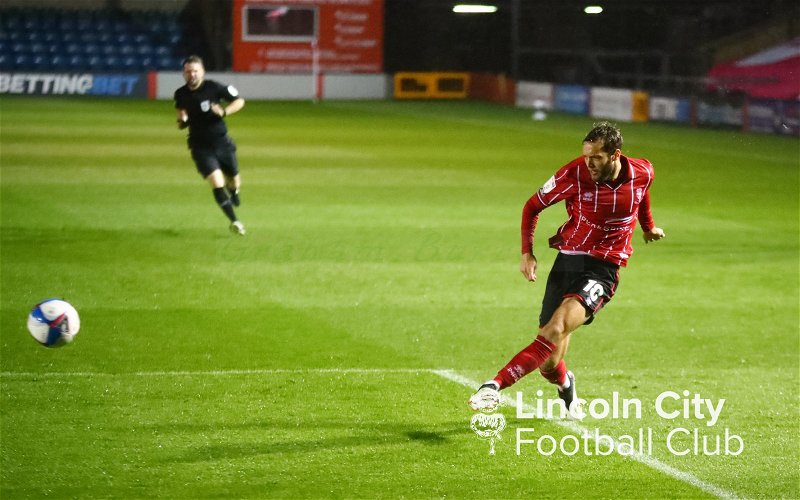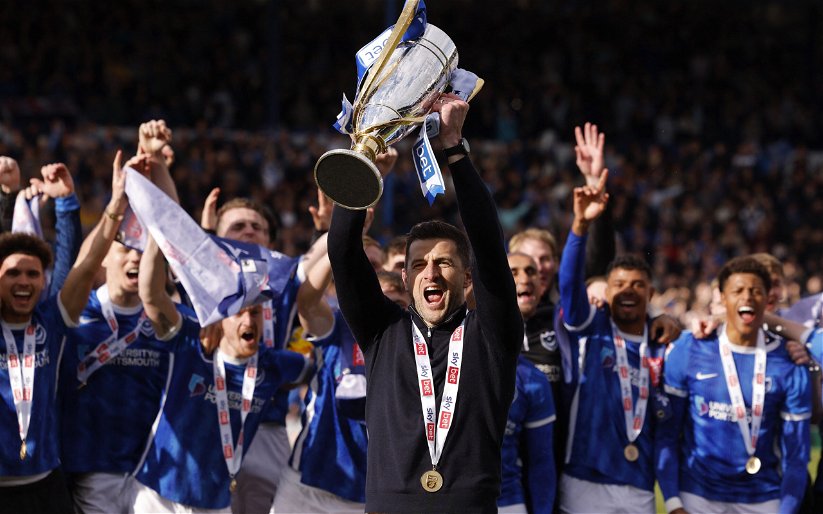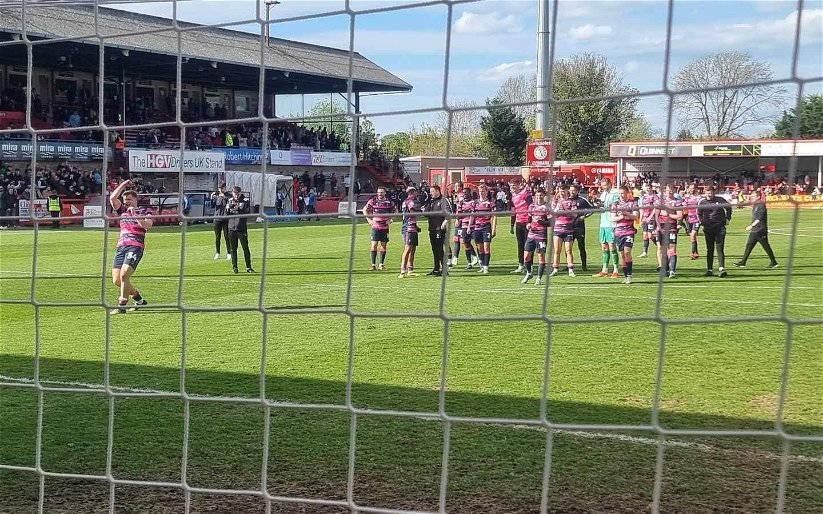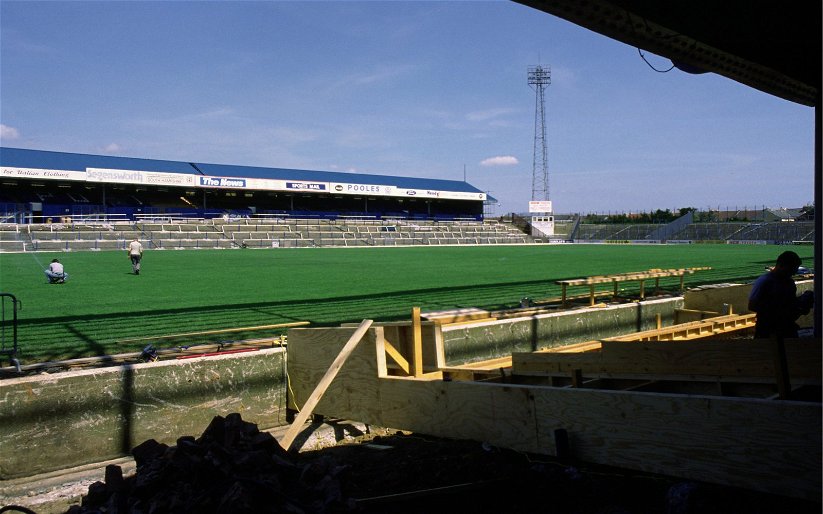The season has started well for Michael Appleton’s new look Imps side. City sit third in League One, having lost just one of their opening seven fixtures in the league and winning eight out of twelve in all competitions – nine if you include the bonus point penalty nonsense in the EFL Trophy. On top of good results, City’s exciting style of play has engaged a fanbase when many clubs are struggling to do just that with fans prohibited from attending games. This style of play is something I want to cover here. The early stages of Appleton’s tenure could be described as slightly concerning. There were wholesale changes to a largely familiar and successful squad, combined with attempts to adopt a new style of play that the players and fanbase were ill-prepared for. The sight of Cian Bolger angrily gesturing to fans in the Co-Op Stand after another dangerous loose pass was greeted by demands to “just boot it” encapsulated this stuttering start.
Nevertheless, there was widespread acceptance amongst reasonable fans that we would hold our judgement until the new gaffer’s first full season with a squad of his own. It certainly is his squad now – Harry Anderson stands alone as the link to our recent non-league past, providing a comforting and perhaps necessary bridge for many. With his fresh cohort of players, Appleton has implemented a new approach. It was abundantly clear from his first few matches in charge that Appleton’s tactics would be more focused on short passing and interplay than those of his predecessor. However, there is more nuance to tactics than a binary choice between direct play and possession, John Beck and Guardiola. Michael Appleton’s tactics have surprised me, and hopefully some others, in that they appear far more focused on creating goalscoring chances than simply dominating possession.
When Appleton came in, he spoke about his philosophies; boldly vowing to stick to his style of play and the much-lambasted short goal-kicks. I’ll admit I was concerned he might be another one of those managers pointing at the possession stats each week as the side drift around the lower echelons of the division. I feared we may devolve into a side obsessed with playing as many passes as possible, impotently shifted it round at the back without as much as a cursory glance at the scoreboard. That, I worried, was League One football; teams good enough to be obsessed with emulating the lauded tiki taka of some elite clubs, not good enough to do it effectively. So far, my worries have been completely unfounded.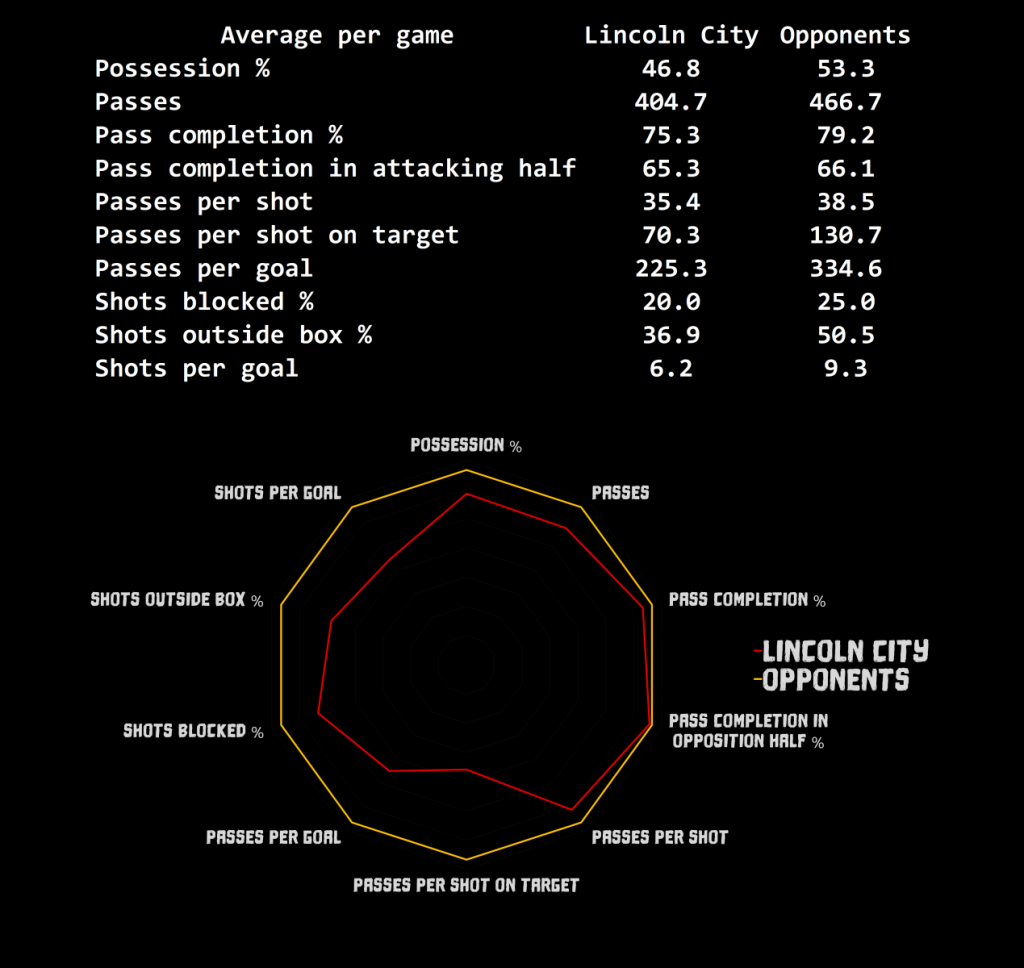
As you can see from my chart, the Imps are outdone by the average of our opponents on every one of these metrics, and long may it continue. I’ll be talking through these one by one to discuss their implications.
Firstly, possession. A stat we’re all familiar with, it has even become something of a cliché to deride its importance, and yet here I go again. Possession can, however, give some indication of a team’s approach and in some cases indicate a dominant team. The Imps’ possession stats reinforce this, in a game against a weak Scunthorpe United side, City had 68% possession (the most so far) but against Liverpool, they managed just 29% (the least so far). Perhaps more interestingly, against teams of Lincoln’s level, the Imps generally accept a lower possession total than their opponents. In fact, City have only had more than 50% in two League One matches, a defeat against Bristol Rovers where the Gas looked to hang onto their lead and in the draw at Fleetwood Town where Appleton admitted being surprised by the hosts’ approach. In every other League One tie, City have had less of the ball, but they’ve won all of those games.
It’s a similar story with total passes. Again, you can see both different levels of sides, but also different styles when teams are at similar levels. Lincoln’s lowest total of 262 came against Liverpool (who have the highest score so far with 676) and City’s highest, 584, came against Scunthorpe United (who hold the lowest tally with 267). Famously possession-based sides MK Dons (649) and Crewe Alexandra (556) scored highly, and the general trend again is City consistently scoring lower than the opposition. City have only counted more passes on four occasions so far, including both EFL Trophy games against League Two sides.
The two-pass completion figures are where City start to close the gap on their opponents. City’s average pass completion overall is respectable at 75.3% but again, the only occasions where the Imps have scored higher than League One opposition on this metric are the two games they didn’t win, perhaps indicating that the side had to adopt a more patient approach against a side absorbing pressure. The two scores are even closer when we look at pass completion in the opponent’s half (designed to nullify the impact of simple passes across the defence on this stat).
Where we can start looking at how quick a side’s approach play is with the number of passes it takes a side to generate chances. In terms of passes per shot, City generally require fewer passes than their opposition, scoring lower in seven of the 12 games and holding the two lowest scores with 20.2 (versus Liverpool) and 20.6 (versus Plymouth Argyle). City’s highest count on this metric was in the loss to Bristol Rovers, reinforcing the earlier point about being forced to adopt a more patient approach against a side holding onto a lead. The Imps’ 53.6 passes per shot in that game is actually the second-highest we’ve seen with only Oxford United’s toothless display scoring more (56.6). Overall, the numbers are relatively similar for City and their opponents on this metric, City averaging 35.4 and their opponents averaging 38.5.
We see far greater contrast in styles when we apply the same metric but only to shots on target. I chose to look at this in an effort to start assessing how many passes were required to generate a better opportunity. In an average of their performances so far, the Imps only require 70.3 passes per shot on target. Their opponents score is almost double that at 130.7. Again, the outlier for City is the Bristol Rovers game, in this match City needed 120.5. This score is considerably higher than any other Imps performance but still below the average for their opponents. By contrast, three opponents have scored over 200! Plymouth Argyle needed 223.5, Fleetwood Town needed 225 and Charlton required 231. To me, this indicates that City are able to create good chances quicker than the opposition.
This is reinforced when we finally look at passes per goal, surely the true test for seeing how efficient a side are in creating good chances. Again, City usually require far fewer than their opponents. Because goals are obviously rarer than shots and shots on target, this metric can vary far more wildly than the previous two which is where their value comes from. What’s more, it’s not uncommon for teams to fail to score entirely. An example of the variation is that City only required 64 shots per goal against Bradford City but needed 584 against Scunthorpe United. However, I feel that over 12 games the sample size is starting to be large enough to draw some early conclusions.
I included the last three metrics to assess my theory that City were creating better chances than their opponents. As you can see, City’s opponents generally have more shots blocked, shoot more from outside the box and require more shots for every goal they score. To me, this indicates that City create better chances and are perhaps more willing to work to create a better opportunity.
Overall, the data suggests to me a surprising style of play from Michael Appleton’s Imps so far this season. Far from being purely focused on possession as I’d feared, City seem primarily concerned with creating good scoring opportunities. The Imps typically have less of the ball, play less passes and complete a marginally smaller portion of those passes than their opponents. Despite this, they have usually outscored their opponents by passing with greater intention to attack whilst simultaneously working to create good chances rather than shoot at every available opportunity.
Writer: Tom Williams (Dreaming of McAuley)
You can discuss what has been said in this article HERE and you can also get involved with many other threads on our 100% Imps forum! Every page view helps raise money for Lincoln City Football Club!
Have a go at our Lincoln City v Ipswich Town Quiz below:
Thank you to Graham Burrell and Lincoln City Football Club for the photograph!
Will The Imps Win, Lose or Draw Against Ipswich Town? - VOTE HERE!
Win

Lose
Draw

Lincoln City's Chance Creation:https://t.co/JxWEo0cqwt#ImpsAsOne #ProudToBeImps pic.twitter.com/eEMYLcI9u3
— Vital Lincoln City (@VitalLincoln1) October 23, 2020
https://www.facebook.com/VitalLincolnCity/posts/3396414480394773
